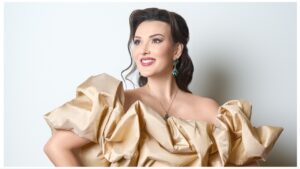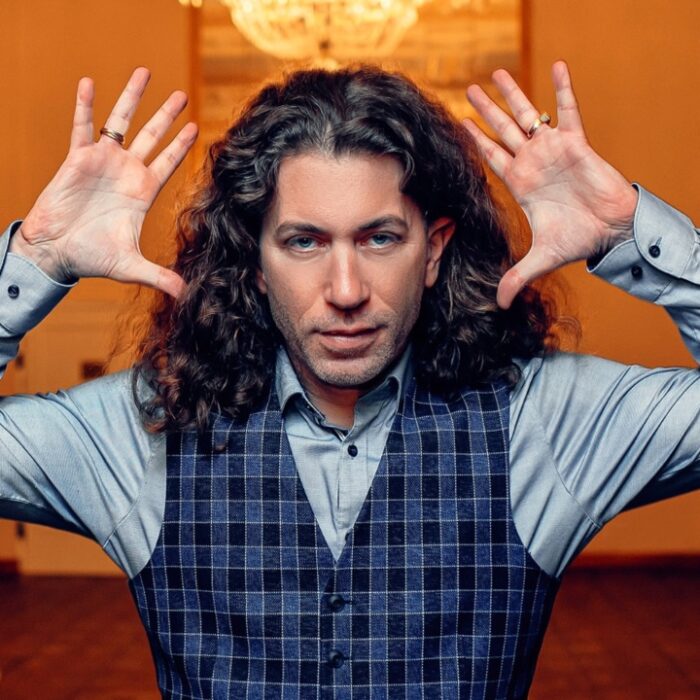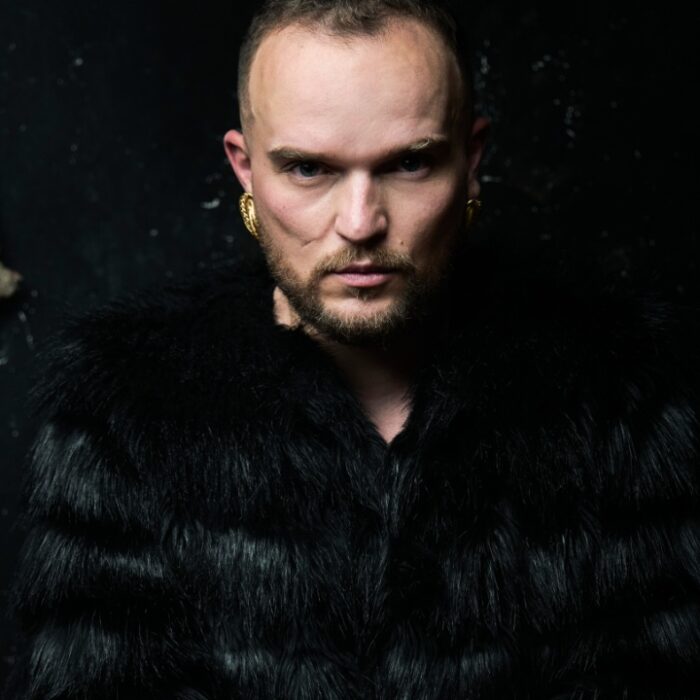
Q & A: Diana Skavronskaya on Her Carnegie Hall Debut and Flourishing Career
By Afton Markay(Photo credit: Michael Meltser)
OperaWire had the pleasure of speaking with soprano Diana Skavronskaya, who is originally from Uzbekistan and currently based in San Francisco. Below, she shares her passion for opera and work to make it accessible for all.
OperaWire: Your résumé includes so many facets within the opera world, from mainstage performances, recitals, teaching, and conducting masterclasses, to international arts representation. Can you please talk about what these mean to you?
Diana Skavronskaya: This is my life’s journey. I am grateful to God for each and every part of it. It is what has shaped the way I view being a professional now. Everything I’ve gone through has given me this wealth of experience that helps me understand where I stand today.
All this has been a big boom to my career and it has given me so much joy to work with professionals. Apart from that, I can now share my own experiences with aspiring artists.
I am grateful for the experiences I have had this far. Life has granted me many opportunities to work with Constantine Orbelian, Sebastian Schwarz, Alessandro Amoretti, Hans-Joachim Frey, Dmitry Vdovin, Eva Wagner-Pasquier, among may others.
OW: Tell me about your Carnegie Hall debut.
DS: I indeed had the honor of performing Rachmaninoff’s music for New York audience in October. The iconic Stern Auditorium / Perelman Stage – it is a venue I’ve dreamt of gracing since the age of fifteen. Maestro Constantine Orbelian and his Cultural Exchange Foundation organized this concert to celebrate 150 Years since the Birth of Sergei Rachmaninoff. He extended the invitation to me. The celebration created a tremendous interest, a lot was written in the media about it. I personally have a deep love for Rachmaninoff’s music. And the acoustics of the hall allowed my voice to unfold in a very special way. The atmosphere was tremendous, it was very welcoming.
It is worth noting that Pyotr Ilych Tchaikovsky conducted his music at the very opening of Carnegie Hall in 1891. And he’s one of my most favorite composers. I’ve absorbed his and Rachmaninoff’s music since childhood. This October, as I walked in, Tchaikovsky’s portrait greeted me in Carnegie Hall, and with the music of Rachmaninoff, I stepped on stage. I felt a sense of pride that my two favorite composers gave me so much strength. I’ve grown very fond of this Carnegie’s Perelman Stage, and I’ll definitely return.
OW: What roles do you hope to perform in the future?
DS: I see the high potential of my voice and have set the bar high. I am open to taking on new roles now. There are certainly a few in my repertoire but I have so many more I want to explore. It’s very difficult to choose just one or two. Medora from Verdi’s “Il Corsaro” comes first to my mind as well as the role of Giulietta in Bellini’s “I Capuleti e i Montecchi.”
For quite some time, one of my absolute favorites has been Violetta Valéry from Verdi’s “La Traviata.” I’ve been nurturing this idea of portraying her, and someday, I’m absolutely sure I will bring her to life.
OW: Can you recall a moment when the audience had a strong impact on your performance?
DS: It was in 2019 when I traveled to Europe for the first time to perform the title role of Susanna from W.A. Mozart’s “Le Nozze di Figaro.” I was still a conservatory student. I couldn’t help but feel proud, but it was a challenge. After all, I was singing in Italy, performing opera in Italian for Italian audiences, opera connoisseurs. That was one of my first contracts and a chance to sing the lead role in an opera with a full orchestra abroad. Obviously, I was nervous. Susanna’s role is indeed one of the most demanding from one of the most famous operas. I was to prove my competence, individuality, and deliver the role to the Italian audience.
However, as soon as the first act was over, I felt an incredible warmth from the audience – they favored my performance. It was so encouraging. Someone even threw a flower on stage – I was not nervous anymore. I couldn’t have been happier to be performing that iconic opera. Having been through such an experience is priceless and very important. I shall forever cherish it.
OW: How do you think American stages differ from international ones?
DS: The last two years have been nothing short of a blessing. I’ve been fortunate to meet so many wonderful and talented musicians in the US. There are so many music aficionados here. It gives me great joy to carry my love of art.
Here in America, people have been most welcoming. I’m delighted that my audiences come to embrace the magical art of opera; and it is a great feeling to be able to do so.
OW: How did you come to start Opera Club? What are your long term plans for the events?
DS: I moved to San Francisco at the end of 2021 and soon after was recognized as an International Operatic Soprano and Classical Singer by the American Guild of Musical Artists (AGMA).
The past two years have been a whirlwind, and one significant aspect was the creation of Opera Club. It is my passion project. I received a Certificate of Honor from the City and County of San Francisco for my contribution in the art life.
What struck me initially was the abundance of talented singers in the Bay Area and around it. I saw that traditional opera houses, of course, also offer a chance to enjoy opera arias and masterpieces of classical music. But they may not always provide a chamber or a close, intimate experience. This is why, right at the beginning, I wanted to found an Opera Club and make it special. I wanted to do this to offer both the performers and the audience an opportunity to immerse in the art of opera. I feel incredibly fortunate to have the opportunity to sing with soloists with Teatro alla Scala in Milan, the Met Opera, with San Francisco Opera, and the Royal Opera House. Amazing musicians fly in to perform at my concerts.
What is most interesting, we would share insights of when a particular piece was created, what the composer intended to say. My audience learns the nuances, and I see a lot of gratitude. Every time, they express their happiness about what I do, showing keen interest in the art of opera. That alone is a tremendous success for me. It’s pure bliss.
For instance, my “Viva La Musica” concert on Nov. 18 went through with flying colors. We chose several opera duets and music from Mozart, Cilea, Tchaikovsky, Dvořák, Lehár, Rimsky-Korsakov, and Caccini.
On Dec. 17, I am organizing a Puccini Gala concert, where we will perform all of Giacomo Puccini’s most beautiful scenes, duets, and trios from the most popular operas. I am also planning a classical music recital at the great Tateuchi Hall in Mountain View, California on On Jan. 20.
I proudly say that the Opera Club is a real gem of the Bay Area and it is going to grow and gain a great prominence. I also plan on organizing concerts in other states across the US.
OW: What experiences have shaped you to become the musician and artist you are today?
DS: These would be examples of my mentors, individuals who have been there for and with me. They have shaped me. Every single day I was fortunate to learn from professionals and opera legends. The knowledge I gained from them is invaluable. The unrivaled Galina Pisarenko, my mentor at the Tchaikovsky Moscow Conservatory, had an enormous role in my vocal career. She gave me so much confidence and assured me that I can accomplish extraordinary results. No one else believed in me more than she did. She inspired me to trust in myself and to believe that I was up to par. And I knew that I was going to be a proud legacy of her vocal school.
I graduated performing the role of Tatyana from “Eugene Onegin.” Pisarenko herself would be considered the best Tatyana of the 20th century, and she told me from the first days that I was going to be Tatyana. In fact, she fully prepared me for the role, more than once saying that I was a natural-born Tatyana.
Makvala Kasrashvili was my mentor at the Galina Vishnevskaya Opera Center for two years. She shared so many stories about the creative opera life, numerous challenges, and incidents. All of this toughened me to become a professional. Makvala Kasrashvili, for the most part, taught what opera is on a global level. She was very knowledgeable about the nature and specifics of international competitions. So, she basically mentored me for an international career.
And Viktor Volsky, the chief artistic decorator at the Bolshoi Theatre, shaped me as a resilient artist. He was someone whom I always aspired to be – a true professional in his field.
Each and every one of them gave me an understanding of what a true artist and professional must be like. Just being around them pushed me to keep growing.
OW: Do you have any advice for young artists starting an opera career?
DS: That’s a very nice question. The answer is very short – you must never push it back to “tomorrow.” Because if you value your strengths and your potential, do not think that you will be at the very top but a bit later, in a year or five. You have that opportunity today. Go the extra mile. Be committed to evolving your career and work with love and passion every day now. Do not think there are years to go. If you are young, strong, talented – make all the necessary efforts to grow as a professional right here and now. This profession is very demanding and takes so much dedication.
My other piece of advice is to attend master classes and workshops held by different stage directors and conductors. An orchestra, for instance, is a huge organism, and conductors would teach you to interpret the music, to feel the material in your own way. Ideally you will have to learn to understand each instrument in the orchestra.
Last but not least, and I follow this myself: every day you should know more than you did yesterday. So, this is what it means to be a professional in your field.
Categories
Interviews

